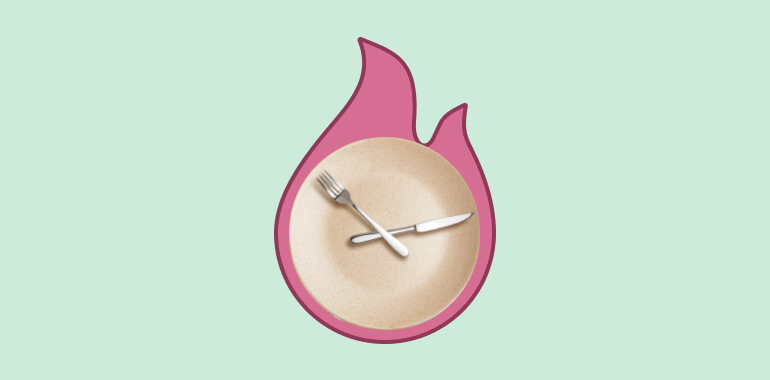Table Of Contents
What is 24-Hour Fast and How Does It Work?
A 24-hour fast is a fasting method where individuals abstain from eating for a period of one full day. This fasting protocol has become increasingly popular as an effective way to maintain a healthy body weight and promote overall health.
It allows the body to rest and reset while eliminating the need always to follow an often restrictive diet. In many cases, people practice this fasting once a week. However, some choose to extend their fasting period beyond a single day.
The idea behind a 24-hour fast is to allow your body to enter a state of ketosis, a metabolic state in which your body switches from using glucose (sugar) as its primary source of energy to using stored fat for energy. This energy metabolism shift can help promote fat-burning and weight loss.
Regardless of how many days someone chooses to undertake to fast, 24-hour fasting can improve physical health by reducing inflammation and improving metabolic health. Additionally, fasting people report better mental clarity and increased overall well-being.
Therefore, considering adding fasting into everyone’s routine can provide tremendous benefits not just for physical health but also for mental well-being.

Is a 24 Hour Fast Healthy and Effective in Long-Term Weight Loss Journey?
A 24-hour fast can be a healthy and practical part of a long-term weight loss journey for some people. Still, it’s important to approach fasting with caution and consult with a healthcare professional before starting any fasting regimen.
Fasting for 24 hours can help reduce calorie intake, which can contribute to weight loss. However, it’s important to note that weight loss is a complex process, and there are many factors that can influence your ability to lose weight and keep it off.
To achieve sustainable weight loss, it’s essential to maintain a healthy diet and regular exercise routine. Fasting should be combined with a healthy lifestyle to support weight loss goals.
Additionally, fasting may not be appropriate for everyone, and it’s important to talk to a healthcare professional before starting a fasting regimen, especially if you have any underlying medical conditions.
It’s also important to note that fasting for extended periods of time can lead to nutrient deficiencies and other health complications. Hence, it’s vital to approach fasting cautiously and ensure you still get all the necessary nutrients your body needs.
The Science Behind Fasting Clears Arteries
While some studies have suggested that fasting may have potential benefits for cardiovascular health, there is limited scientific evidence to support the claim that fasting clears arteries.
However, fasting may have other potential benefits for cardiovascular health. For example, some studies have suggested that intermittent fasting may help reduce inflammation and oxidative stress, which can contribute to cardiovascular disease development.
Other studies have suggested that fasting may help improve blood pressure, cholesterol levels, and blood sugar control, which are essential for maintaining cardiovascular health.
So, more research is needed to fully understand the potential benefits of fasting for cardiovascular health. Some evidence suggests that fasting may positively affect cardiovascular function and may be a helpful tool in promoting heart health. However, it’s vital to approach fasting cautiously and talk to a healthcare professional before starting any fasting regimen, especially if you have any underlying medical conditions.
10 Evidence-Based Benefits of 24-Hour Fast Once-a-Week Results
Intermittent fasting has been an increasingly popular lifestyle choice and with good reason.
Research suggests that regularly engaging in 24-hour fasting once a week can have positive health benefits. This type of fasting does not alter the amount you eat; it merely shifts when you eat. While fasting can be challenging at first, it offers evidence-based health rewards such as increased longevity, improved insulin sensitivity, and greater overall metabolic efficiency.
Further, it has been found to reduce inflammation while potentially enhancing cellular repair processes and improving disease prevention markers. This simple dietary change may boost your long-term health with a bit of practice and determination.
Promotes weight loss
Yes, fasting for 24 hours can help create a calorie deficit, which can lead to weight loss over time. When you fast for 24 hours, your body uses your liver’s stored glycogen for energy. After the glycogen stores are depleted, your body begins to burn fat for fuel, which can lead to weight loss.
Additionally, by restricting calorie intake for a 24-hour, you may reduce overall calorie intake and create a calorie deficit, which can contribute to weight loss over time.
However, it’s essential to maintain a balanced and healthy diet when you’re not fasting to ensure that your body gets all the necessary nutrients it needs for optimal health.
Also, read – 48 Hour Fast and How It Can Transform Your Health & Wellbeing
Lowers blood pressure
24-hour fasting has been gaining attention recently as a possible method for reducing cardiovascular risk. Research has shown it to improve lipid parameters and enhance metabolic health, and this fasting method removes arterial plaque within the coronary arteries of heart patients.
This technique involves abstaining from eating for an entire day, usually either one or two times per week. It helps lower cholesterol levels and body weight, consequently reducing the risk of diseases such as atherosclerosis (hardening of the arteries). Fasting can also modulate inflammation, which is linked to many diseases, including obesity, cancer, and diabetes.
Improves insulin sensitivity
Fasting for 24 hours can help improve insulin sensitivity, which can help regulate blood sugar levels and reduce the risk of type 2 diabetes. Insulin sensitivity refers to how effectively your body uses insulin to regulate blood sugar levels. When you fast for 24 hours, your body’s insulin sensitivity can improve because the presence of food is not constantly stimulating it.
By improving insulin sensitivity, your body can more efficiently regulate blood sugar levels and reduce the risk of developing insulin resistance, a critical factor in developing type 2 diabetes.
Reduces inflammation
Some studies suggest that intermittent fasting can help reduce inflammation in the body, which is linked to many chronic diseases, including heart disease and diabetes.
Improves immune function
24 hour fast keto can be beneficial to overall health and wellness.
Studies have documented declines in inflammation and oxidative stress following a 24-hour fast, which may positively affect immune function. It is important to note that proper medical guidance should be followed before initiating any fasting regimen; however, if done correctly, it could provide significant health benefits.
Once accustomed to a 24-hour fast, users have documented higher energy levels and improved cognitive clarity. Research into the impact of fasting has revealed promising results for those looking to improve their health by focusing on diet and lifestyle changes.
Promotes autophagy
Fasting can trigger autophagy, a process in which the body breaks down and recycles damaged or dysfunctional cellular components. This can promote cellular regeneration and protect against certain diseases.
Boosts brain function
Some studies suggest that fasting can enhance cognitive function, improve mental clarity, and boost brain-derived neurotrophic factors (BDNF), a protein that promotes the growth and survival of brain cells.
Reduces oxidative stress
Studies have found that 24-hour fasting can be a beneficial practice for reducing oxidative stress. Oxidative stress, which is usually caused by an imbalance of free radicals in the body, has been linked to many chronic diseases, including heart disease and Alzheimer’s. As fasting reduces inflammation, which is associated with oxidative stress, it is therefore thought to be helpful in preventing and reducing the effects of these chronic conditions.
Trying out fasting once a week may seem like a manageable task. Still, it should always be undertaken under the guidance of a healthcare professional, as they can give you tailored advice on how to approach this practice safely and what the best possible outcomes may be.
Promotes longevity
As aging populations become more and more of a focus for many countries, the practice of fasting for 24 hours may be seen as an invaluable new way to promote longevity and reduce the risk of age-related diseases.
Studies have highlighted the potential benefits of periods of abstinence from food, which may be a valuable tool to increase life expectancy in the coming years. In addition, evidence suggests that fasting can potentially improve metabolism, optimize gene expression, and boost neuroplasticity, all of which may improve health in the long term.
Improves cardiovascular health
Intermittent fasting, the practice of limiting food consumption to a specific window of time, has garnered much attention for its potential to enhance cardiovascular health. Recent scientific literature suggests that 24-hour intermittent fasting may provide critical benefits such as lowered blood pressure, improved insulin sensitivity, reduced inflammation, and oxidative stress.
This type of fasting is believed to act on underlying aspects of metabolism that can profoundly affect our overall well-being and long-term health – making it an attractive option for those interested in optimizing their cardiovascular health.
Despite its potential benefits, 24-hour fasting requires mindful adherence and is unsuitable for everyone. Individuals should consult their physicians before trying this practice as it could have potentially adverse consequences if not done carefully.
How 24 Hour Intermittent Fasting Lower Blood Pressure?
Intermittent fasting has become a popular tool for weight loss and other health benefits. One of these benefits is the potential to lower blood pressure. 24-hour intermittent fasting, also known as alternate day fasting, involves alternating between days with no caloric intake and those with a normal-sized meal.
It is gaining attention among healthcare practitioners as an effective way to modify health outcomes due to its potential beneficial effects on body weight, insulin sensitivity, and biomarkers of cardiovascular risk.
This promotes fluctuations in hormones that are beneficial to avoiding hypertension. In addition, scientific studies have shown that short-term intermittent fasting can reduce resting systolic and diastolic blood pressure levels by up to 8%. However, caution should be taken when using this method as an intervention for high blood pressure as it may be better suited to address its root causes or as part of a complete lifestyle change for the best results.
In recently published research, researchers conducted a short-term study of one-day intermittent fasting findings in obese patients with hypertension who were taking regular antihypertensive medications. Results showed that the intervention was well tolerated and did not cause hypotension but instead led to a favorable alteration in blood pressure.
This finding has important implications for clinicians as it suggests that one-day intermittent fasting can be a safe and tolerable treatment strategy for individuals with hypertension, even when complemented by antihypertensive medications.
How to Correct Start 24-Hour Intermittent Fasting Cholesterol Transformation
It’s crucial to approach intermittent fasting with caution and consult a healthcare professional before starting any fasting regimen, especially if you have high cholesterol or any other underlying medical conditions.
That being said, some studies have suggested that intermittent fasting may help to improve cholesterol levels and reduce the risk of heart disease. To get started with 24-hour intermittent fasting for cholesterol transformation, you may want to consider the following tips:
- Start with a shorter fasting period: If you are new to fasting, it’s best to start with shorter fasting periods, such as 12 or 16 hours, and gradually work your way up to a 24-hour fast. This can help your body adjust to the changes in energy metabolism and minimize the risk of harmful side effects.
- Focus on healthy, nutrient-dense foods: During your eating window, it’s important to focus on healthy, nutrient-dense foods that can support heart health and cholesterol transformation. This includes foods like fruits, vegetables, whole grains, lean protein, and healthy fats.
- Stay hydrated: It’s important to stay hydrated during a 24-hour fast. Drinking plenty of water, herbal tea, or other non-caloric fluids can help to keep you feeling full and energized.
- Monitor your cholesterol levels: It’s important to monitor your cholesterol levels regularly, especially if you have high cholesterol. Working with a healthcare professional can help you track your progress and adjust your fasting regimen as needed.

How Many Calories Do You Burn Fasting for 24 Hours?
The number of calories burned during a 24-hour fast varies depending on a number of factors, including your age, weight, sex, and activity level.
During a 24-hour fast, your body switches from using glucose (sugar) as its primary source of energy to using stored fat for energy. This shift in energy metabolism can lead to increased fat burning and can contribute to weight loss over time.
- Generally speaking. However, research suggests that an individual will typically burn approximately 0.7 cal/hour during a period of 24-hour fast, meaning the person would burn around 17 calories in full.
While this is not a significant amount, the benefits of intermittent fasting are well documented and include improved blood sugar regulation and reduced inflammation, among many others. Ultimately, determining if 24-hour fasting is proper for you should be done on an individual basis with the consultation of a physician or nutritionist.
However, it’s difficult to estimate the number of calories burned during a 24-hour fast, as it depends on many factors and can vary widely from person to person. It’s important to note that fasting is not a substitute for regular exercise and a healthy diet for weight loss.
If you are looking to lose weight, it’s important to focus on creating a sustainable calorie deficit through a combination of healthy eating and regular exercise. Fasting can be a helpful tool in this process, but it should be approached with caution and with the guidance of a healthcare professional.
How Often Should I Fast for 24 Hours?
The frequency with which you should fast for 24 hours depends on many factors, including your overall health, lifestyle, and weight loss goals. Therefore, it’s crucial to approach fasting cautiously and consult with a healthcare professional before starting any fasting regimen.
In general, it’s recommended that individuals who are new to fasting start with shorter fasts and gradually work their way up to longer fasts, such as a 24-hour fast. This can help to minimize the risk of harmful side effects and make the fasting experience more comfortable.
Once you’ve become accustomed to fasting and have talked to a healthcare professional about the potential risks and benefits, you may be able to fast for 24 hours on a regular basis. Some people fast for 24 hours once or twice a week, while others may fast for 24 hours every other week or once a month.
Ultimately, the frequency you should fast for 24 hours, depending on your individual needs and goals. It’s essential to listen to your body and adjust your fasting regimen as needed to ensure that it is safe and effective for you.
Final Thoughts
In conclusion, is fasting once a week sound? So, any regular fasting can come with many health benefits. The idea of fasting for 24 hours once a week as part of your lifestyle presents a feasible and efficient way to reap the rewards that come with fasting overall.
In addition to its scientific findings, fasting has psychological effects worth considering when taking on this practice. Of course, it requires dedication on the part of the individual, but it should not be seen as a chore or burden – instead, it should be viewed as a chance to increase energy levels and engage in self-care both physically and mentally.
Overall, regular 24-hour fasts can reduce inflammation, aid in weight loss and management, improve mental clarity, slow down aging processes, and so much more – meaning that you can enjoy the whole armor of benefits from just one day of fasting each week!
My name is Barbara Kovalenko. I hold a Bachelor's degree in Human Nutrition from Bogomolets National Medical University in Ukraine and a Master's degree from Boston University in the United States. Over the past few years, I have gained valuable experience as a nutritionist and have since decided to share my knowledge and expertise with a wider audience. Currently, I am working as a nutritional consultant with the Lasta app.









